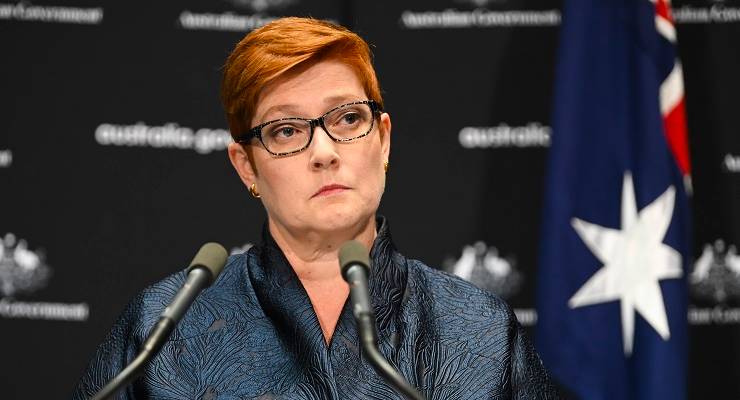
“Minister, has your trust in China been eroded?”
It’s not the kind of question federal ministers relish given the current state of Australia-China relations, but David Speers persisted in pressing it on Foreign Minister Marise Payne on the ABC’s Insiders.
Payne responded cautiously:
“Well, my trust in China is predicated on the long-term relationship. My concern about these issues, though, is at a very high point. My concern is around transparency and ensuring that we are able to engage openly …”
Not bad as answers go. In Australia it makes sense to answer a question about trust with a bold statement on transparency and openness.
The problem is that in China it makes no sense at all.
Leaders of Australia’s major political parties are united in seeking greater transparency from China on the origins and spread of the coronavirus. Marise Payne went a step further in calling for an international inquiry into the matter. Any inquiry could only earn trust, she said, if all parties showed “willingness to be transparent”.
Transparency and trust go together in Australian public life. Australians trust one another to do the right thing, whether they know one another or not, and they consider openness essential for maintaining public trust.
Australians may not trust government or big business but on the whole they trust one another and they value transparency as a foundation for the public trust that makes their society work. Trust is a public good.
In China, trust is a personal thing. People say they trust the central government but they certainly don’t trust local officials and they don’t trust one another.
Trust is embedded not in public life but in relationships among particular people, families, communities and networks. Transparency is indifferent to these relationships and often corrosive of them. Where personal trust or network trust are concerned, transparency and openness have little place.
In the absence of viable public trust, people in China build skeins of trust among themselves through inter-personal networking. Network building, or guanxi, is regarded as the way to advance family, business, or factional interests in competition with rival families, firms and networks.
This kind of inter-personal trust is predicated not on openness but on secrecy, particularly when it comes to covering one another’s backs in the event of trouble. Not surprisingly, the ability to keep secrets from others is counted a sign of trustworthiness.
There are ample justifications for this kind of behaviour in the Confucian canon, as there are in Aristotelian ethics if we go looking for them. Allusions to classical thought can only be illustrative, never explanatory. But they illustrate a good deal.
In this sense, People’s China could be said to operate on the principle set out in Confucius’ advice to the Duke of She. “There is a person in my hometown so upright that he reported his father for stealing a sheep,” the Duke of She told Confucius. Confucius replied (Analects 13:18):
In my hometown we have a different sense of what it is to be upright. A father will conceal the misconduct of the son, and a son conceal the misconduct of the father. Now that’s what I call upright.
The moral of this classic Confucian dictum is that interpersonal trust in relationships outweighs all other moral duties, including expectations of honesty and transparency.
We could cite rival schools of ethics from China’s classical period which flatly contradict this Confucian dictum and come closer to notions of honesty and forthrightness familiar to Australians. The tension between loyalty and honesty is universal, and plausible solutions are canvassed in a variety of ways in different ethical traditions.
The Confucian take on loyalty and trust is in any case perfectly familiar to Australians. Old boy networks could not work any other way, and the maxim “never dob in a mate” appears to have been coined by the Australian union movement. The American equivalent “never rat on your friends” is a standard line in mobster movies.
But in these cases the linkage between secrecy and inter-personal trust is associated with collusion, corruption and crime and not with high ethics. In People’s China the link between trust and secrecy is valourised as an ethical principle underpinning what it means to be an upright citizen.
The take-away moral from China’s current Confucian ethical revival is that personal relations are hierarchical and carry obligations of inter-personal trust that compel families, networks and governments to know their place and conceal one another’s misconduct from prying eyes and intrusive authorities.
This passes for public morality in contemporary China not on account of the poverty of China’s ethical tradition, which is as rich as any, but because the Communist Party has reinstated the hierarchical ethics that underpin classical Confucianism and because it has refused to allow the freedoms essential for public trust to develop on its watch.
It follows that People’s China will never accede to a request for openness from a middling power such as Australia. This would be beneath its dignity and would corrode the kind of mutual trust it has in mind.
Responding to a question from the ABC correspondent in Beijing yesterday, Chinese Foreign Ministry spokesperson Geng Shuang described Marise Payne’s comments as both wrong and “disrespectful”. He expressed the hope nevertheless that Australian government would work to “enhance mutual trust”.
Is this even possible? In People’s China, trust means remaining true to friends, not being a friend to truth. It means recognising who’s the boss and who’s the foot soldier.
In particular, it means concealing the truth if friends would be harmed in the telling or if it placed at risk superiors who place their trust in you.
This is the kind of trust that China’s communist leaders are looking for in Australia. No questions asked. The kind of trust that Australians hope to find in China, on the other hand, demands openness and transparency.
Marise Payne was right to answer as she did, but perhaps the question could have been worded differently.
Rather than ask whether recent events have eroded trust between China and Australia, we should probably be asking whether it is possible to build trust between such incommensurable value systems.
If so, what would it take? And if not, what on earth is to be done?








CP56 in the SMH ‘comments’ yesterday
https://www.smh.com.au/politics/federal/morrison-pushes-for-global-review-into-handling-of-covid-19-20200421-p54lub.html#comments
“The PM and many others say “It’s important the WHO acts, and all parties that are part of the WHO, act with great transparency,. fair enough, But I note that Australia has had a member on the WHO Executive Board (which oversees its governance and performance) for at least three years. This was the recently departed Secretary of the Federal Health Department. Can the PM tell us transparently how many times Australia’s representative raised concerns about WHO practices in those three years. And the New Secretary of Health, the CMO Dr Murphy, can no doubt raise these issues internally if he becomes Australia’s new Board member on WHO. Why a separate inquiry that China will block in the UN anyway?”
The PM and many others say “It’s important the WHO acts, and all parties that are part of the WHO, act with great transparency,. fair enough, But I note that Australia has had a member on the WHO Executive Board (which oversees its governance and performance) for at least three years. This was the recently departed Secretary of the Federal Health Department. Can the PM tell us transparently how many times Australia’s representative raised concerns about WHO practices in those three years. And the New Secretary of Health, the CMO Dr Murphy, can no doubt raise these issues internally if he becomes Australia’s new Board member on WHO. Why a separate inquiry that China will block in the UN anyway
Mmm…so we’re the shining exemplars of mutual trust and support despite the neo- con dictum about there being no such thing as society just individuals competing with one another but, all the same, trusting one another at the same time. Bollocks!
On the eve of Anzac Day, our national celebration of mateship and mutual concern, readers might want to listen to a Radio National pod – The Myths of War – particularly that which discusses prisoner experience on the Burma- Thai railway. The behaviour of our Officer class there was despicable – paid under the Geneva Convention and not required to work, there is yet no record of an officer volunteering to take the place of a man unfit to go out. On the contrary, a class system prevailed where officers pilfered from food stores and commandeered garden beds painfully prepared by other ranks to augment their meagre rations. The differential death toll was enormous – officers in single digits, other ranks in the thousands. Some COs handed men over to the Japanese for punishment or informed them of attempted escapes. One contemptible example returned to Australia and an OBE.
Such bastard behaviour did not extend to MOs (Medicos) who had to defer to Combat Officers anyway. “Weary” Dunlop was ashamed when a group of British officers who shared a compound and who proposed a pooling of wages to help the men, threatened to move to another area after Australian officers refused to chip in. If “Australians hope to find in China… demands for openness and transparency” they certainly didn’t find in the hell holes of Japanese captivity nor have we been honest about it since.
“Transparency and trust go together in Australian public life. ” What? This Australia with all its intrusive government spying on citizens and concealment of information from those same citizens? Not at all. Yes, I trust my neighbours. My Government clearly doesn’t trust me, how can I trust it? Should I trust the corporations that run my local stores? Do they trust me? Yes in my childhood in the 1950s there was a lot of trust around. Not much now.
While I agree totally with your view I still found this a most interesting and knowledgeable article.
I commented elsewhere her today this investigation gag is just lazy easy domestic politics and another suck up to the US. Either way it looks like crying over spilt milk. Look forwards. Plenty of actual work still to be done. I know our pollies have had to do some real work for a change rather than rattling cages and kicking heads but the pressure is still on. So give the XYZ bashing a rest and (as Mr Burns would say) – get back to work !
This was a fine piece which dares to say that not all cultures are the same, let alone of equal value.
The sense of civis is a very limited one – it requires the trust that unrelated & unknown persons are equally honourable to oneself which is quite rare in history
Me against my brother, we against the neighbours, our village against another, my country right or wrong does not meet the criterion of civis.
In current health terms it can be a matter of life & death.
Sounds like Britain in the 1700’s. Patience is needed, I think. If China truly wants to thrive it will have to learn that what most of the rest of the world sees as dishonesty does not make for long term beneficial relationships.